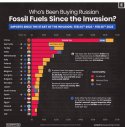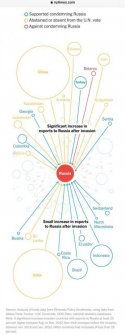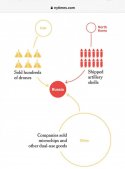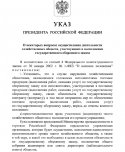You are using an out of date browser. It may not display this or other websites correctly.
You should upgrade or use an alternative browser.
You should upgrade or use an alternative browser.
Russia Economy Thread
- Thread starter NiuBiDaRen
- Start date
The above Graph is not really accurate. Russia-UAE trade will double that number.
India and Turkey trade is much higher number not including 2023.
India and Turkey trade is much higher number not including 2023.
INDIA-RUSSIA bilateral trade hit a high of $35 billion in April-December 2022, with $32.8 billion contributed by imports, a 400% jump from $6.5 billion in same period of the previous year. Within imports, petroleum-related products accounted for as much as $27.7 billion, a 700% increase from $3.4 billion a year ago. If foreign trade data of first nine months of FY23 is any indication, Russia is set to become India's fifth-biggest merchandise trade partner, up from 25th last year. The reason is surge in imports, especially oil, from Russia.
AliExpress stopped selling drones and spare parts for them to customers from Russia
At the same time, previously purchased DJI drones are now limited in functionality. The company removed the application for managing them from the Russian App Store
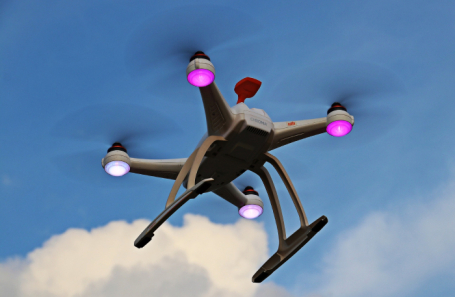
Photo: pixabay.com/noname_13
AliExpress service the opportunity for customers from Russia to buy drones manufactured by DJI and Autel. When searching, the entire range of quadrocopters present on the site drops out. However, when you try to open a window for a specific unit of goods of any company, the message “This page does not exist” appears on the screen. Only a few items of low-power and cheapest devices remained available.
Earlier, the media reported that DJI, the largest drone manufacturer, has removed device control applications from the Russian App Store. DJI responds to all complaints that it does not provide services to customers from Russia. Are such drones used by our military in the NVO zone? Opinion of a military expert, founder of the Military Russia portal Dmitry Kornev.

military expert, founder of the Military Russia portal“DJI Mavic is probably the most hyped product from DJI drones. Since the beginning of the special military operation, to be honest, DJI Mavic drones have been used in the special military operation zone for a variety of purposes. The device is quite reliable, relatively powerful, and can also be used as a reconnaissance drone, because its range is quite decent, and there are models with very good characteristics - that is, it can rise several hundred meters in height, fly several kilometers, and very it's easy to operate and gives great HD picture quality and can basically carry some kind of load. The manufacturer of these drones is aware of how their drones are being used. Apparently, some work was done with China or with the manufacturer, probably by overseas partners, which led to the fact that that supplies are blocked. It's no secret that these devices mostly came into the zone of action of a special military operation through private purchases. China not only does not sell drones of this class to the Russian Federation, but, probably, China does not want the previously delivered drones to be operated - sales of software and spare parts are closed. In fact, the maintenance of this equipment on the territory of the Russian Federation will be carried out in an artisanal and unofficial way, that is, by private individuals and specialists who are able to assemble, disassemble, set up and launch. Of course, this will also affect household surveillance systems - thermal imagers, night vision devices, some other devices used by fishermen and hunters, video surveillance systems. I think that there will still be surprises, unfortunately.” that basically these devices fell into the zone of action of a special military operation through private purchases.
As for other potentially dual-use devices, there are no restrictions on their sale on AliExpress yet. The Russian warehouses of Ozon and Wildberries sellers have the drones the expert is talking about. Fast shipping offered.
In the longer term, with their acquisition, as well as with the purchase of expensive iPhones, there should be no problems. Logistics, however, will be more expensive than directly from China, says Digital Media Editor-in-Chief, digital technology expert Pavel Sinyakov.
Pavel SinyakovEditor-in-chief of Digital Media, digital technology expert Pavel Sinyakov“There are services, commercial structures that deliver goods from “ unfriendly ” countries and do it through their own channels. This, of course, will be more expensive, but you can buy. I think that now to buy almost anything is not a problem at all. But there is the issue of price. That is, it is clear that people turned to AliExpress, as there are low prices.
Metropolitan stores selling copters and spare parts are still fully stocked, says Dmitry Polyakov, operator, drone pilot, founder of Hey Dron, a company for aerial photography from quadrocopters:
Dmitry Polyakovoperator, drone pilot, founder of Hei Dron, a quadcopter aerial photography company“Specifically, our fleet is now fully staffed, there have been no purchases recently, so we have not had time to face this problem yet. But they heard the news. Let's hope for some kind of parallel import. As experience has shown, parallel imports work in the case of Western countries, we hope that this will work with China as well - we will look for some logistical ways to get the spare parts and copters we need. In Moscow stores - resellers of Chinese spare parts for copters, there are no problems with this: they ordered calmly and received everything. But, of course, there are concerns [as it will be in practice now].”
On Thursday, March 2, US Secretary of State Anthony Blinken Beijing with sanctions if China provided military assistance to Russia. And the day before, German Foreign Minister Annalena Burbock that China's military assistance to Russia would be considered a violation of international law. This means that “drones cannot be provided” to Russia.
Last edited:
This is long talk with industrialists. but this the interesting part.
Vladimir Putin: Patimat Magomedovna, first of all, the very important topic that you touched upon is North-South, a new transport corridor. We have been dealing with all the logistics related to the eastern direction for a long time, and in principle, the end point of the route [North-South] is also the east. Unfortunately, they did not take it in a timely manner, that is, they accepted, but did not fully implement all the investment decisions that they considered necessary, then they began to doubt. It's really a shame they didn't. Now it is clear - in hindsight we are all smart - but now it is clear that we missed a little time. But we will make up for it, nothing irreparable happened there.
As for the "North-South" - this is an additional opportunity to expand the flow of goods just to the east. Why? Because it is from St. Petersburg just across the territory of Dagestan ...
Pavel Gamidova: Along the entire North Caucasus.
Vladimir Putin: Then through the territory of Azerbaijan, access to Iran and then to the ports of the Persian Gulf, and from there to the Middle East, the Far East, and the Asia-Pacific region. This is Iran itself, and then India, and China, and the entire South-Eastern region.
There are several possible routes. The first route is just Dagestan, then Azerbaijan, Iran and access to the Persian Gulf. Or to the ports of the Caspian Sea on Russian territory, including Dagestan, and then to the Iranian port, and then further - towards the Persian Gulf. And the third route - again through the territory of Russia, starting from St. Petersburg, then Kazakhstan, Turkmenistan and again the entrance to Iranian territory - it is more difficult, but also a possible option.
The first, if you go by sea, is still working, but we need to create appropriate conditions there together with our Iranian friends and partners, including terminals for receiving and sending cargo already on the Iranian coast.
As for the route you mentioned, if you go through the territory of Dagestan, then go to Azerbaijan and then to Iran. There are the cities of Astara and Rasht (Astara on the territory of Azerbaijan and Rasht on the territory of Iran), in my opinion, 162 kilometers, where there is no railway. And then you need to finish building this piece, 162 kilometers, to the entrance to the transport and railway networks of Iran.
We support this project, Iran supports the project, and Azerbaijan supports this project. It is very interesting not only for us, but also for all participants in world trade, because it is a significant addition to the Suez Canal and the Black Sea straits. This simply reduces the cost of the route, which means that the final price of the goods will be cheaper. In this, many participants in world trade are interested and would like to take part.
I want to emphasize this: everyone agrees. Despite the complexity of geopolitical alignments and various contradictions between the countries of the region, which always arise between neighbors, everyone agrees that this route should be built.
We now only need to understand how fast we will do this, what are the final sources of funding. But we will find them, and there is an opinion that we do not need to attract them from somewhere else. In practice, we are able to finance this construction from scratch, which [on the section] Rasht - Astara should be built.
The issue of wide or narrow gauge - 1520 or 1435 - is in principle already a theoretical issue, we have generally resolved it, and everyone agrees with our decision. You just need to start. I ask everyone involved in this issue in the Government to speed up this process. We will try to do this as quickly as possible.
In my opinion, the first part is about 1,700 kilometers, there are 1,500–1,600 [kilometers], and it will cost about the same: somewhere between one billion five hundred and one billion six hundred. We need to find this money, we can find it inside the country, by and large, we can find it from our potential investors.
By the way, I would like to address everyone present here: keep in mind that this is a very good project, cost-effective, preferential, and many of our partners, including those in the Arab world, are showing the most active interest in this. It will work - just like the Suez Canal, the Bosphorus and the Dardanelles. This will work. The NWO has passed, started, started again, passed again, but the goods will continue to flow, one hundred percent, and will always be in demand.
Therefore, we need to find sources and consolidate the sources of financing for this project. It might be interesting for everyone. And the Government just needs to think about how to add up this pool of potential investors.
To be honest, I would like it to be primarily Russian investors. Why should we miss such projects? Profitable, good project.
I repeat, even despite the geopolitical alignments and difficulties, everyone agrees. We will do it.
The queues for a Chinese visa at the consulates of Moscow and St. Petersburg are several weeks

The building of the Embassy of the People's Republic of China in Moscow. Photo: Sergey Vedyashkin/AGN "Moskva"
Updated at 17:37
Russia has recorded a boom in demand for visas to China. In Moscow and St. Petersburg, after the resumption of work of visa centers, all free slots for submitting documents to the Chinese consulates ended in two days, reports .
According to market participants, visa applications are accepted only two days a week and no more than 400 applications. Therefore, in the capital's consulate, everything is already busy until the end of May, and in St. Petersburg - until April 20.
At the end of last year, China resumed issuing business visas to Russians, which was important for business during the period of sanctions. Sergey Sedov, the owner of the Go China tour operator, comments:
“Hundreds of thousands of people immediately rushed to apply for these business visas, and already in January at the embassy, which at that time worked only twice a week, entries for submission were closed for January, February and March. This happened three months ago. The limited number of documents that the embassy is ready to accept every day is much less than it was before the pandemic, until 2020. This is due to the fact that indeed the record is so far ahead - April, even May. Those people who are waiting for tourism, tourism, I think it's worth waiting for a while until it all levels out, until the embassy starts working every day, as it used to be. They have already restored four days a week instead of two, the embassy is open in Moscow except Friday, but this is still not enough. The situation may change even tomorrow, the President of China flew to us, said to resolve the issue,
- Is an influx of shuttles to China expected now, as it was in the 90s?
“They call us in large numbers, they are waiting for the renewal of tourist visas, because traditionally they cost several times less than a business visa, and they say that they need to go on exploration, to understand whether this is relevant or not relevant, it makes sense for us to transport goods like in the 90s or not. People are in limbo, because they cannot calculate the final cost, see what's going on.
On March 15, Beijing again began documents for all types of visas, and there were no free windows on the website of the consulates, Business FM was confirmed on the hotline of the visa center:
- Now the consulate is overloaded with business trips, because this category of visa was opened in the first place. Now, in principle, tourism is not exactly sorted out, because the filing calendar has remained the same, but since the consulate is overloaded, it begins to accept tourism only from the end of April. But, of course, as always happens, of course, there are other ways, if you need to fly earlier, they still exist, they just cost much more. There are, of course, opportunities to apply out of turn, it all depends on the cost of the visa. The turnkey visa includes fees, filling out a visa application, consultation on the list, submission of documents, receipts, that is, without your personal presence. If this does not suit you, there is also the option of preparing documents for 9,600 rubles, but in this case we transfer the package of documents to you, you submit it personally.
- In St. Petersburg, for example, they expect that free slots will appear in a month, but I can apply either in Moscow or St. Petersburg, it doesn’t matter where?
- The closest slot for today when applying without your personal presence, for example, in St. Petersburg, is just the same - April 25, closer slots are not expected yet. If you are ready to fly, go to St. Petersburg, it is also possible, 9600 is our preparation, and you yourself hand it over in St. Petersburg, because in Moscow there is already an appointment for June.
According to the vice-president of the Russian Union of Travel Industry Dmitry Gorin, Kommersant notes, the growth of the tourist flow is also constrained by limited air traffic. “Only aircraft without double registration can fly to China, and Russian airlines have only 180 such boards,” he said. According to OneTwoTrip, Aeroflot, Air China, China Eastern Airlines and Hainan Airlines are now flying to the Celestial Empire, the publication indicates.
broadsword
Brigadier
Visa should be obsoleted between the two countries. Interactions should be promoted for travel and business already.
The Central Bank will speak Chinese
Ksenia Kulikova about the benefits of learning friendly languages
At the beginning of the week, the Bank of Russia posted on the Sberbank AST site a request for proposals for the provision of educational services for learning Chinese "in the field of professional communications." Whether the placement of the application coincided with the beginning of the visit of Chinese President Xi Jinping to Russia by chance, or whether the regulator’s employees guessed the time on purpose, history is silent. More importantly, the "pivot to the East" is being expressed more and more clearly.And it cannot be said that the Russian financial authorities avoided their eastern neighbor. Regular visits were made, memorandums and agreements were signed, including banking supervision, the development of settlements and payment systems, etc. Five years ago, a significant part of the Central Bank’s gold and foreign exchange reserves was also transferred to Chinese yuan, which by the beginning of 2022 reached 17%. Yes, and the Chinese language, they assure the regulator, employees have been taught for years.
But apparently, communication did not always take place in the same language. Now the situation will gradually improve. As stated in the project documentation, about four groups of students of four to eight people will be trained annually. Of course, against the background of the total number of employees of the Central Bank (at the beginning of 2022 - more than 45 thousand people), this seems ridiculous. But cooperation (as, apparently, language teaching) promises to be many years.
Central Bank employees will have to complete 288 academic hours of the program, more than 70% of which will be for practical training. Foreign experience will be studied for its "use in business processes and professional communication in the field of international cooperation."
Of course, practical interest in China is expanding against the backdrop of an increase in trade between the two countries, which reached $190 billion last year. The volume of Chinese currency trading on the Moscow Exchange is growing, the largest issuers, including Rusal, Rosneft, bonds in yuan. Reorienting to a new market and financial institutions. The recruitment of employees with knowledge of the Chinese language was reported in Ingosstrakh Investments. Alfa-Bank sees great prospects in developing relations with Chinese organizations, including financial institutions.
According to HeadHunter estimates, the demand for Chinese-speaking employees in the financial sector grew by 113% in a year. A February Superjob study noted that the number of jobs that require knowledge of the Chinese language has doubled in a year. With other friendly countries in mind, requests for teaching Arabic and Turkish and even Farsi can be expected. Although, given the volume of trading, this may not be necessary so quickly.
Expand to full screen

